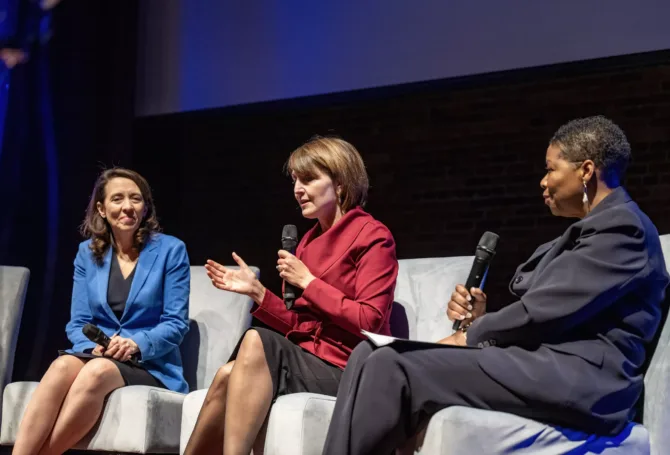
Hearings, Tough Conversations, Presidential Politics Lie Ahead
The House Select Committee on Strategic Competition between the United States and the Chinese Communist Party starts hearings this week on what amounts to a United States divorce from China.
“Everyone made the same basic bet on China,” Committee Chair Mike Gallagher, R-Wisconsin, said in a weekend interview. “That bet made sense. It was logical. But it failed. So now we’re trying to extricate ourselves.” Gallagher foresees a two-year examination leading to “selective decoupling” of the world’s two largest and increasingly competitive economies.
The prime-time Tuesday night hearing comes as U.S. intelligence says China is weighing whether to provide lethal weapons to Russia for its invasion of Ukraine and as tensions mount over the fate of Taiwan. A Chinese spy balloon floating across America didn’t help. “Our hope is to come away from [hearings] with a better sense of why China is a threat,” said Gallagher, a self-described China hawk.

Mike Gallagher
China Sparks Bipartisan Concern
Concern over China’s economic and foreign policies are bipartisan, according to Gallagher. “We’re not going to agree on 100 percent of everything,” he told the media over the weekend. “There may be times when I want to go further and more aggressively than the Democrats want to go, and vice versa. But we’re going to try to preserve the bipartisan center of gravity.” The House approved formation of the select committee by a 365-65 vote.
“I have a lot of respect for Mike Gallagher in terms of how he’ll conduct the committee in a serious way, but it’s important to see how the conversations unfold,” say Democratic Congressman Ro Khanna of California, a member of the committee. “For those of us who are concerned about not devolving into a cold war or anti-Asian American sentiment, we have to be particularly vocal.”
“There is a bipartisan consensus that China poses a broad challenge to the United States across multiple domains,” says Patricia Kim, an expert on US-China relations at the Brookings Institution. “I don’t believe we have a clear consensus on the precise mix of policies that are necessary to address this challenge.”
Tough Conversations with Business Leaders
Gallagher anticipates tense conversations with U.S. businesses that have manufacturing facilities in China or farmers who depend on exports to China. He plans on calling industry officials to testify or talk behind closed doors about the trade-offs of doing business in and with China.
“I understand why major American companies have a massive presence in China for the same reason John Dillinger robbed banks: That’s where the money is,” Gallagher said. “And I get that the ship of state is an aircraft carrier that doesn’t turn on a dime, so we’re not going to selectively decouple overnight, and I’m not calling for a complete decoupling.”
“It’s a very fraught environment for companies to operate in,” explains Scott Kennedy, senior adviser at the Center for Strategic and International Studies. “They’ve become careful to a fault.” Despite tensions, two-way trade between the United States and China reached an all-time high in 2022 of $700 billion.
The Biden administration is “divided” on how to deal with China, Gallagher believes. The National Security Council and the Pentagon seem more inclined to confront China, he says, while officials whose top priority is fighting climate change believe in a more cooperative relationship with China.
Gallagher foresees a wide spectrum of potential actions, ranging from delivering long-promised weapons to Taiwan to changes in trade and tax policy. “The American system is premised on competing views,” Gallagher says. “We’ll preserve room for honest disagreement and debate. It doesn’t need to be holding hands and singing Kumbaya all the time.”

Andy Kim
Committee Coincides with Presidential Election Cycle
The committee’s projected two-year schedule coincides with the 2024 presidential election cycle. Many Republicans claim Biden is weak on China policy. Far-right conservatives accuse Biden of having financial ties with China through his son, Hunter Biden. Democrats warn that continued talk of a new cold war is potentially dangerous. “There’s a fine line between deterrence and provocation,” Congressman Andy Kim, D-New Jersey, says, “and crossing over [the line] is only going to inflame and create greater escalatory challenges.”
There is also concern about inflaming anti-Asian feelings. Gallagher appeared on a national news show over the weekend to disclaim a congressional Republican’s comments about Congresswoman Judy Chu, D-California. “We should not question anybody’s loyalty to the United States,” he said. “I think that is out of bounds.”
On the same show, Gallagher said, “I want both sides in some way to look to the committee as the area for the most forward-leaning, innovative, and bipartisan policy and legislation on China.”
A Pew Research survey shows 82 percent of Americans hold an unfavorable view of China, more than twice the figure in 2012 when Xi Jinping came to power. Republicans harbor negative views of China more than Democrats and are more likely to support the United States adopting a hardline approach.
As Xi consolidated power, he also has built up China’s military, including in the South China Sea. The Pentagon recently informed Congress China now has more missile silos than the United States, though the U.S. nuclear force remains larger than China’s.




